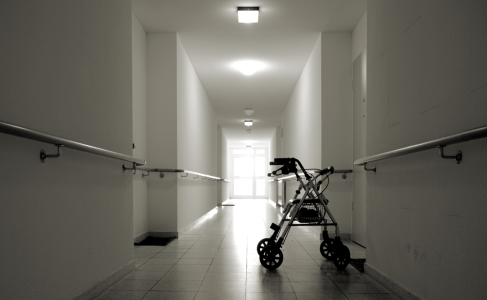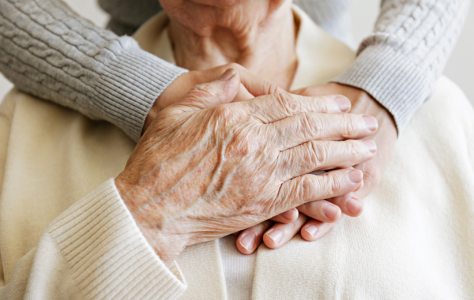Family accuses care facility of unauthorised chemical restraint: ‘Dad was turning into a zombie’
By
- Replies 31
The sanctity of aged care facilities is one of the pillars of a compassionate society, where the elderly are meant to spend their twilight years in comfort and dignity.
However, a disturbing incident at a Tasmanian government-run aged care facility has cast a shadow over the care being provided to our most vulnerable citizens.
The family of Maurice Long has come forward with harrowing allegations of chemical restraint without consent, raising serious concerns about the practices in aged care institutions and the potential risks faced by residents.
Maurice Long, an 86-year-old man who lived independently for two decades, entered the Beaconsfield District Health Service in Tasmania's north-east, seeking full-time care.
Tragically, within approximately two months of his admission, he passed away.
His son, Leigh Long, is now grappling with the belief that his father's life was 'shortened' due to the substandard care he received, which he alleges included the unauthorised use of antipsychotic medication.
‘had to lose Dad due to maybe a serious blunder or mistake, so we've paid the ultimate price as a family,’ he said.
‘Every day that goes by, I think about my dad. I dream about him every night. I just can't stop reliving the care and the treatment he got.’
‘I miss him so much.’
Leigh witnessed Maurice's ability to walk, talk, and manage his care deteriorate alarmingly fast.
‘There was something wrong with Dad. He was going downhill, Dad was turning into a zombie,’ Leigh said.
‘He could hardly walk, he couldn't talk.’
Leigh, who held enduring guardianship and was responsible for making medical decisions on his father's behalf, claimed that the facility administered risperidone, an antipsychotic medication, without his consent.
‘We were up there visiting Dad, and it was quarter to five, and the nurse said, “We've got to give your dad his five o'clock tablet before he goes to tea.”’ he said.
‘And I said, “he doesn't have a five o'clock tablet”, and she said, “Oh no, he has a five o'clock tablet. I'll check on it.”’
‘She came back and said, 'We're sedating him.’
Leigh mentioned that he had discovered the tablets were first administered to his dad after one of his initial nights at the facility when the buzzer in his room had been pressed multiple times.
He was unsure if his dad had been pressing the buzzer button, getting out of bed, and standing on a mat next to it, which would activate the buzzer.
‘They started sedating Dad with medication due to his undiagnosed dementia for pushing a buzzer 19 times in an hour,’ Leigh explained.
He said he had attempted to halt the medication being given to his father by reaching out to a local GP, Maurice's cardiologist, and even contacting a solicitor.
The ABC obtained a letter from the cardiologist requesting that the medication be discontinued.
‘Mr Maurice Long has been a patient of mine of over ten years,’ it said.
‘This 86-year-old gentleman's family are concerned about the use of risperidone for him and the side effects on his health. Therefore, I would request that the risperidone be ceased.’
The cardiologist subsequently advised Maurice to consult a doctor at another health facility for a conclusive diagnosis and treatment plan.
Leigh stated that the facility disregarded his requests and neglected the cardiologist's directive to stop the medication.
‘It was a battle, and I was never able to stop it,’ he said.
‘It was shocking, it was to the point where Dad was gone well before he died because this medication changed him so much.’
The family also discovered bruising on Maurice's body, including around his neck and arms.
Leigh sought answers regarding his father's care at the Beaconsfield facility and the standards maintained there.
He questioned why the facility had begun sedating his father without consent.
The family lodged complaints with the Australian Health Practitioner Regulation Agency, the Aged Care Quality and Safety Commission, and Tasmania's Health Department.
Although Leigh Long had not yet received an official response from the Department of Health, he had been exchanging emails with departmental staff, some of whom had apologised.
‘I'm so sorry for the loss of your father and for the awful experience he and your family experienced at the Beaconsfield Hospital.’ one of the staff said.
‘I’m very sorry that this has occurred and for the way that your concerns were managed by the service.’ another said.
Tasmania's Health Department informed the ABC that it thoughtfully considers all concerns and complaints about the care provided in its health system and is actively reviewing the matter.
‘Communication is continuing between the department and family members about the complaint.’ they stated.
‘We empathise with anyone whose experience in our health system falls short of the standards we expect, but it is not appropriate for us to comment further on individual circumstances for reasons of privacy and confidentiality.’
During the last fiscal year, the Aged Care Quality and Safety Commission received 150 complaints regarding residential care in Tasmania.
Robbie Moore from the Health and Community Services Union highlighted significant issues in the aged care sector, particularly understaffing, which hinders timely care delivery to residents.
Moore emphasised delays in essential activities like using the restroom and getting out of bed, describing these challenges as unacceptable for older people in nursing homes.
‘[Residents] are delayed in going to the toilet. They're delayed in when they get out of bed,’ he said.
‘We keep hearing awful stories that no one else in the community would accept, so why do we accept it for older people just because they're in a nursing home?’
‘We need to see the staffing levels so that people can have a decent life.’
Since the beginning of the year, the national aged care regulator has identified six non-compliant facilities in Tasmania.
Among these, Lyell House at the West Coast District Hospital, operated by the state government, failed to meet six out of eight standards.
Issues highlighted by the regulator include concerns with chemical restraint, where medication was administered to a resident for over five weeks without consent.
Significant staffing challenges were also noted, with a heavy reliance on overtime and agency staff.
Mr. Moore emphasised the importance of holding senior government officials accountable for these issues.
‘There's no way that it is acceptable that in public-run institutions in Tasmania, we shouldn't be meeting the national guidelines. That's a very reasonable expectation from Tasmanians.’ he said.
Brigid Wilkinson, Chief Executive of the Council on the Aging Tasmania, emphasised that these allegations within aged care point to larger systemic issues within the sector.
‘We trust that when we need to make that decision for an older family member to receive the care that they need in a care facility, that they're going to get that care and that they're going to be treated with respect,’ she explained.
‘So, any allegations that people were treated inappropriately, or an instance of neglect or abuse, we would be very concerned about.’
‘It actually really disgusts me because I think that every human being is worthy of being treated with dignity and respect, irrespective of their age.’
Displeased with the care at Beaconsfield, Leigh relocated his father to another aged care facility.
According to Leigh, Maurice was unable to walk, talk, or attend to his own toileting needs at that time.
‘I had a duty of care to Dad to remove him from that facility, from that danger, because all my life he looked after me. I had to do something in return.’ he said.
‘I was hoping things would come back to, “Hey, Dad's good now, we've fixed it.”’
‘Sadly, he died. The damage was done.’
‘With the facility up there … and the medication, the damage was already in place.’
In response to the growing concerns, Tasmania's Department of Health has initiated a voluntary statewide audit of its facilities that offer residential aged care services.
‘These audits include consideration of a range of matters, including the use of restrictive practice,’ a spokesperson stated.
‘In relation to staffing, all of the Department's district hospitals — including the six facilities that provide residential aged care services — have a safe staffing model which identifies the appropriate safe staffing level for each of the facilities.’
‘A number of strategies are used to support this model, including recruitment, increases to working hours where appropriate, and redeployment from other services or sites as required.’
‘This whole-of-system collaboration is very common across the health system to ensure the needs of Tasmanians are met.’

Have you or your loved ones encountered issues with care or the use of chemical restraints? How can we improve the aged care system to prevent such incidents? Feel free to share your insights in the comments below.
However, a disturbing incident at a Tasmanian government-run aged care facility has cast a shadow over the care being provided to our most vulnerable citizens.
The family of Maurice Long has come forward with harrowing allegations of chemical restraint without consent, raising serious concerns about the practices in aged care institutions and the potential risks faced by residents.
Maurice Long, an 86-year-old man who lived independently for two decades, entered the Beaconsfield District Health Service in Tasmania's north-east, seeking full-time care.
Tragically, within approximately two months of his admission, he passed away.
His son, Leigh Long, is now grappling with the belief that his father's life was 'shortened' due to the substandard care he received, which he alleges included the unauthorised use of antipsychotic medication.
‘had to lose Dad due to maybe a serious blunder or mistake, so we've paid the ultimate price as a family,’ he said.
‘Every day that goes by, I think about my dad. I dream about him every night. I just can't stop reliving the care and the treatment he got.’
‘I miss him so much.’
Leigh witnessed Maurice's ability to walk, talk, and manage his care deteriorate alarmingly fast.
‘There was something wrong with Dad. He was going downhill, Dad was turning into a zombie,’ Leigh said.
‘He could hardly walk, he couldn't talk.’
Leigh, who held enduring guardianship and was responsible for making medical decisions on his father's behalf, claimed that the facility administered risperidone, an antipsychotic medication, without his consent.
‘We were up there visiting Dad, and it was quarter to five, and the nurse said, “We've got to give your dad his five o'clock tablet before he goes to tea.”’ he said.
‘And I said, “he doesn't have a five o'clock tablet”, and she said, “Oh no, he has a five o'clock tablet. I'll check on it.”’
‘She came back and said, 'We're sedating him.’
Leigh mentioned that he had discovered the tablets were first administered to his dad after one of his initial nights at the facility when the buzzer in his room had been pressed multiple times.
He was unsure if his dad had been pressing the buzzer button, getting out of bed, and standing on a mat next to it, which would activate the buzzer.
‘They started sedating Dad with medication due to his undiagnosed dementia for pushing a buzzer 19 times in an hour,’ Leigh explained.
He said he had attempted to halt the medication being given to his father by reaching out to a local GP, Maurice's cardiologist, and even contacting a solicitor.
The ABC obtained a letter from the cardiologist requesting that the medication be discontinued.
‘Mr Maurice Long has been a patient of mine of over ten years,’ it said.
‘This 86-year-old gentleman's family are concerned about the use of risperidone for him and the side effects on his health. Therefore, I would request that the risperidone be ceased.’
The cardiologist subsequently advised Maurice to consult a doctor at another health facility for a conclusive diagnosis and treatment plan.
Leigh stated that the facility disregarded his requests and neglected the cardiologist's directive to stop the medication.
‘It was a battle, and I was never able to stop it,’ he said.
‘It was shocking, it was to the point where Dad was gone well before he died because this medication changed him so much.’
The family also discovered bruising on Maurice's body, including around his neck and arms.
Leigh sought answers regarding his father's care at the Beaconsfield facility and the standards maintained there.
He questioned why the facility had begun sedating his father without consent.
The family lodged complaints with the Australian Health Practitioner Regulation Agency, the Aged Care Quality and Safety Commission, and Tasmania's Health Department.
Although Leigh Long had not yet received an official response from the Department of Health, he had been exchanging emails with departmental staff, some of whom had apologised.
‘I'm so sorry for the loss of your father and for the awful experience he and your family experienced at the Beaconsfield Hospital.’ one of the staff said.
‘I’m very sorry that this has occurred and for the way that your concerns were managed by the service.’ another said.
Tasmania's Health Department informed the ABC that it thoughtfully considers all concerns and complaints about the care provided in its health system and is actively reviewing the matter.
‘Communication is continuing between the department and family members about the complaint.’ they stated.
‘We empathise with anyone whose experience in our health system falls short of the standards we expect, but it is not appropriate for us to comment further on individual circumstances for reasons of privacy and confidentiality.’
During the last fiscal year, the Aged Care Quality and Safety Commission received 150 complaints regarding residential care in Tasmania.
Robbie Moore from the Health and Community Services Union highlighted significant issues in the aged care sector, particularly understaffing, which hinders timely care delivery to residents.
Moore emphasised delays in essential activities like using the restroom and getting out of bed, describing these challenges as unacceptable for older people in nursing homes.
‘[Residents] are delayed in going to the toilet. They're delayed in when they get out of bed,’ he said.
‘We keep hearing awful stories that no one else in the community would accept, so why do we accept it for older people just because they're in a nursing home?’
‘We need to see the staffing levels so that people can have a decent life.’
Since the beginning of the year, the national aged care regulator has identified six non-compliant facilities in Tasmania.
Among these, Lyell House at the West Coast District Hospital, operated by the state government, failed to meet six out of eight standards.
Issues highlighted by the regulator include concerns with chemical restraint, where medication was administered to a resident for over five weeks without consent.
Significant staffing challenges were also noted, with a heavy reliance on overtime and agency staff.
Mr. Moore emphasised the importance of holding senior government officials accountable for these issues.
‘There's no way that it is acceptable that in public-run institutions in Tasmania, we shouldn't be meeting the national guidelines. That's a very reasonable expectation from Tasmanians.’ he said.
Brigid Wilkinson, Chief Executive of the Council on the Aging Tasmania, emphasised that these allegations within aged care point to larger systemic issues within the sector.
‘We trust that when we need to make that decision for an older family member to receive the care that they need in a care facility, that they're going to get that care and that they're going to be treated with respect,’ she explained.
‘So, any allegations that people were treated inappropriately, or an instance of neglect or abuse, we would be very concerned about.’
‘It actually really disgusts me because I think that every human being is worthy of being treated with dignity and respect, irrespective of their age.’
Displeased with the care at Beaconsfield, Leigh relocated his father to another aged care facility.
According to Leigh, Maurice was unable to walk, talk, or attend to his own toileting needs at that time.
‘I had a duty of care to Dad to remove him from that facility, from that danger, because all my life he looked after me. I had to do something in return.’ he said.
‘I was hoping things would come back to, “Hey, Dad's good now, we've fixed it.”’
‘Sadly, he died. The damage was done.’
‘With the facility up there … and the medication, the damage was already in place.’
In response to the growing concerns, Tasmania's Department of Health has initiated a voluntary statewide audit of its facilities that offer residential aged care services.
‘These audits include consideration of a range of matters, including the use of restrictive practice,’ a spokesperson stated.
‘In relation to staffing, all of the Department's district hospitals — including the six facilities that provide residential aged care services — have a safe staffing model which identifies the appropriate safe staffing level for each of the facilities.’
‘A number of strategies are used to support this model, including recruitment, increases to working hours where appropriate, and redeployment from other services or sites as required.’
‘This whole-of-system collaboration is very common across the health system to ensure the needs of Tasmanians are met.’
Key Takeaways
- Allegations have surfaced of chemical restraint without consent and rough handling in Tasmanian aged care facilities, with one family believing their relative's life was shortened by the care received.
- The family of Maurice Long, who died shortly after entering a government-run aged care facility, raised concerns about the administration of antipsychotic medication without consent and found bruising on his body.
- Tasmania's health department is actively reviewing the complaints, with ongoing communication with the family, and has stated that it takes the care provided across the health system very seriously.
- Tasmania's Department of Health undertook a voluntary statewide audit of facilities offering residential aged care services, in addition to regular audits by the Aged Care Quality and Safety Commission.










